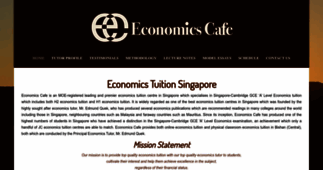Economics Cafe
Enter a key term, phrase, name or location to get a selection of only relevant news from all RSS channels.
Enter a domain's or RSS channel's URL to read their news in a convenient way and get a complete analytics on this RSS feed.
Unfortunately Economics Cafe has no news yet.
But you may check out related channels listed below.
[...] price elasticities of demand for exports and imports must be greater than one. A fall in the exchange rate will lead to a rise in the price of imports in domestic currency. When the price of imports [...]
[...] currency and an increase in the supply of domestic currency resulting in a fall in the exchange rate. When this happens, domestic goods and services will become relatively cheaper than foreign [...]
[...] The exchange rate of a currency is the rate at which the currency can be exchanged for another currency. It is [...]
[...] high quality teaching in economics under the tutelage of the principal economics tutor, Mr. Edmund Quek. Economics Tuition @ Economics Cafe Principal Economics Tutor: Mr. Edmund Quek [...]
[...] 5pm on Tuesday or Wednesday. Economics Tuition @ Economics Cafe Principal Economics Tutor: Mr. Edmund Quek [...]
[...] arranged for them in March. Economics Tuition @ Economics Cafe Principal Economics Tutor: Mr. Edmund Quek [...]
[...] the economics tuition class. Economics Tuition @ Economics Cafe Principal Economics Tutor: Mr. Edmund Quek [...]
[...] the difference between current prices and base-year prices in the balance of payments and aggregate demand. The Marshall-Lerner condition states that for a devaluation of domestic currency to improve [...]
[...] increase in consumption expenditure and investment expenditure will lead to an increase in aggregate demand resulting in an increase in national output. Further, an increase in national output will [...]
[...] Why have many economics teachers misunderstood the Marshall-Lerner condition? The reason is that they do not fully understand the difference between current prices [...]
[...] national income of Singapore is $1000 (100 x $10). Assuming that the exchange rate of the Singapore dollar against the Malaysian Ringgit is RM2.50/S$1. Further assume that the Singapore dollar [...]
[...] to exchange for or purchase 1 Singapore dollar. It is important to note that the exchange rate of a currency is expressed as the amount of [...]
[...] expenditure, investment expenditure, government expenditure on goods and services and net exports. Unlike the balance of payments where the values are measured at current prices, the values in [...]
[...] become relatively cheaper than foreign goods and services which will lead to an increase in net exports and hence aggregate demand. To understand quantitative easing, we need to have a deeper [...]
[...] and services in the two countries. Therefore, the real exchange rate is a better indicator of net exports. When the real exchange rate falls, net exports will rise, other things being equal. The [...]
[...] and aggregate demand. The Marshall-Lerner condition states that for a devaluation of domestic currency to improve the balance of payments, the sum of the price elasticities of demand for exports [...]
[...] money inflows will fall and hot money outflows will rise. When this happens, the demand for domestic currency will fall and the supply will rise which will lead to a fall in the exchange rate. A [...]
[...] which will not affect the result. Assuming that Singapore produces only one good, let’s say economics textbooks. Further assume that the quantity of economics textbooks produced in Singapore is 100 [...]
[...] in the banking system. The level of interest rates in the economy varies directly with interbank rates, particularly the interbank overnight rate known as the Singapore overnight rate in Singapore [...]
[...] it is never linked to aggregate demand. As a side note, do you think that the demand for economics tuition is price elastic or inelastic in Singapore? And what do you think about the income [...]
[...] In 2013, about 91% of Singapore-Cambridge GCE ‘A’ level students taking economics tuition at Economics Cafe were awarded a distinction. The result is one of the best in Singapore and [...]
[...] price elasticities of demand for exports and imports must be greater than one. A fall in the exchange rate will lead to a rise in the price of imports in domestic currency. When the price of imports [...]
[...] currency and an increase in the supply of domestic currency resulting in a fall in the exchange rate. When this happens, domestic goods and services will become relatively cheaper than foreign [...]
[...] The exchange rate of a currency is the rate at which the currency can be exchanged for another currency. It is [...]
Related channels
-
Return of the Cafe Racers
Today on Return of the Cafe Racers
-
Steve's blog
A blog about what's going on in Analysis UK...
-
SitePoint
Learn CSS | HTML5 | JavaScript | Wordpress | Tutorials-Web Development | Reference | Books and More
-
Hotelsroom-co-ukhotelsroom-co-uk - Whisky Cafes, Bars and Lounges in Cana...
Whisky Cafes, Bars and Lounges in Canada
-
Omnis FX Capital
Currency and Exchange Services for Private and Corporate Clients.

